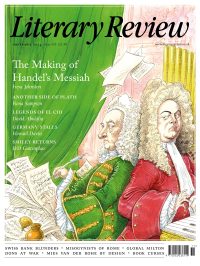Felix Taylor
Death by Goose
Saints: A New Legendary of Heroes, Humans and Magic
By Amy Jeffs
riverrun 448pp £30
With Saints, Amy Jeffs makes her own contribution to the centuries-old tradition of abridging and compiling saints’ lives. Medieval hagiographies, or lives of saints, served as edifying examples of piety from which lessons could be learned. They might be recited aloud in social settings, woven into sermons or popular song, or used for private devotion. The prevailing view among late 20th-century scholars was that they acted as bridges between the laity and the educated clergy, with folklore added to the mix to bring townspeople closer to orthodox religion. More recently, the presence of folklore in hagiographies has been seen as evidence of the interchange of oral cultures between the two classes. In her new book, Jeffs chooses to foreground the miraculous and magical components of hagiography. Perhaps inspired by the current mania for folklore, myths and fairy tales, she sets out ‘to enchant you, to appal you, to transport you to another world’.
Jeffs has already succeeded in laying out Britain’s wealth of medieval literature in two anthologies, Storyland and Wild, each illuminated with her own lino prints and woodcuts. This book is similarly illustrated, Jeffs having created the black-and-white images by making cuts in paper. Like the lives of saints produced in medieval Europe, Saints is arranged according to the liturgical year, taking in feast days and the Labours of the Months. Each narrative is accompanied by a brief commentary, describing the sources she has drawn on, along with alternative versions. These exegeses are somewhat academic in tone, reflecting the breadth of research that went into the book, but they are nevertheless in keeping with the style of the retellings. The lives of the individual saints are linked to one another through recurring themes, such as male virtus (bodily strength in relation to moral virtue), the survival of cults, shrines and relics, animal transformation and religious syncretism. Anecdotal asides from Jeffs’s university days give a sense of this material still being studied.
Most of the tales Jeffs relates involve bodily transformation or resurrection. The royal virgin Werburgh not only brings a digested goose back to life, but also reconstitutes it in midair, sinews and all. The servant who ate it collapses to the floor ‘in a pool of his own vomit’.

Sign Up to our newsletter
Receive free articles, highlights from the archive, news, details of prizes, and much more.@Lit_Review
Follow Literary Review on Twitter
Twitter Feed
Under its longest-serving editor, Graydon Carter, Vanity Fair was that rare thing – a New York society magazine that published serious journalism.
@PeterPeteryork looks at what Carter got right.
Peter York - Deluxe Editions
Peter York: Deluxe Editions - When the Going Was Good: An Editor’s Adventures During the Last Golden Age of Magazines by Graydon Carter
literaryreview.co.uk
Henry James returned to America in 1904 with three objectives: to see his brother William, to deliver a series of lectures on Balzac, and to gather material for a pair of books about modern America.
Peter Rose follows James out west.
Peter Rose - The Restless Analyst
Peter Rose: The Restless Analyst - Henry James Comes Home: Rediscovering America in the Gilded Age by Peter Brooks...
literaryreview.co.uk
Vladimir Putin served his apprenticeship in the KGB toward the end of the Cold War, a period during which Western societies were infiltrated by so-called 'illegals'.
Piers Brendon examines how the culture of Soviet spycraft shaped his thinking.
Piers Brendon - Tinker, Tailor, Sleeper, Troll
Piers Brendon: Tinker, Tailor, Sleeper, Troll - The Illegals: Russia’s Most Audacious Spies and the Plot to Infiltrate the West by Shaun Walker
literaryreview.co.uk